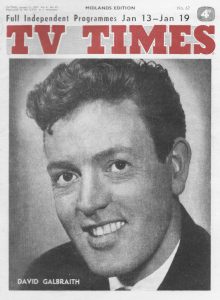Since Rediffusion Television started the weekday independent television service for London it was always the intention to provide a programme service which should contain not only entertainment but also information and education.
Less and less is it remembered that the early days of this operation were full of difficulties. The conversion of the television reception facilities of millions of households from a single programme to multi-programme, with the attendant economic and technical problems was not exactly easy. In addition the general public, used to television programmes studded with long gaps of potters’ wheels and watermills, had to learn to accept television programmes with advertisements in natural breaks. Finally it was difficult to convince some people that television advertising was really worthwhile.
These were some of the initial difficulties which caused heavy financial losses and, indeed, some of the pioneers did not have the faith or patience to keep with it. It was under such difficult conditions that in 1956 Rediffusion Television (then Associated-Rediffusion) decided to introduce school television programmes so as to complete its range of entertainment, information and education.
Naturally such a step was received by many with some scepticism. It took a lot to convince people that Rediffusion did not intend to use the schoolroom as a place for subliminal or even direct advertising. The fact that the school television service was proposed right from the beginning without advertising and in close collaboration with the educational authorities was referred to by at least one educationalist as “too good to be true”. There were also others with a direct interest in teaching who were worried that school television might result in a form of direct teaching, replacing school teachers and also reducing the standard of teaching. There was correspondence about this in newspapers by well-meaning people with either too little or too much imagination but, as mostly happens in the educational world, commonsense eventually prevailed. Now more and more educationalists see the value of television as a great audiovisual aid to teaching if properly co-ordinated with the thinking of those primarily responsible for teaching.
As far as it is possible to express in financial terms the value of teaching services, there is little doubt that the sum of £5,000,000 or so that has been spent over the last 10 years by the BBC (out of licence revenue) and independent companies (out of their advertising revenue) has given greater educational value than the same money could have produced if it had been spent on any other form of educational service.
After a disappointing start, we have now reached the stage where over half the schools in the country use school television services. This means that some millions of children now benefit from up-to-date audiovisual aids. It is believed that it will not be many years now before educational television enters nearly every school in Britain.
Those of us who have been connected with the school television service since the planning days over 10 years ago think we are extremely fortunate to have this great experience. We intend to continue our efforts in the school television field in future and to continue to seek advice and guidance from teachers. Our aim is to raise the standard and acceptability of the programmes to an even higher point than they attain to-day.
On behalf of Rediffusion Television Limited I wish to thank everybody who has given us so much help in the planning and application of school television programmes, and in particular, the members of our Educational Advisory Council. I wish to thank, too, all those working in the Independent Television Authority and in the other independent television companies for their collaboration. My appreciation also goes to the BBC for what they are doing in school television and especially for help in co-ordination so that the schools can get the best results out of both school television services. In addition special thanks are due to the thousands of teachers in schools throughout the country who are the final and most important link between the school television service and the pupils. Many of them are of great help to us with their constructive criticism. Last and mostly I wish to thank all those in Rediffusion Television who have first as pioneers, and now as veterans of school television, done so very much to make it a success.















